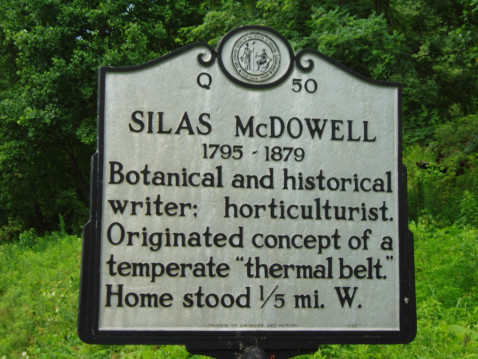
On July 14, 1879, Silas McDowell, prolific self-taught scientist and originator of the concept of the thermal belt, died.
Originally from York, South Carolina, McDowell attended school at Asheville’s Newton Academy and then began work as a tailor in Charleston. He returned to the North Carolina mountains in 1823 and bought a farm in what’s now Macon County. There, in Franklin, he began a long career of farming, viticulture and horticulture, including an extensive apple production operation that developed many new varieties.
McDowell applied science to all his endeavors, published articles on agriculture and began to develop a theory of thermal belts from his observations. In 1861, he published his best-known article, “Theory of the Thermal Zone,” in which he proposed the idea of the thermal belt, a mountainside temperate zone ideal for growing crops.
McDowell also made contributions to botany, guiding a number of the day’s prominent botanists in explorations of the state’s mountains. His wide-ranging interests also included mineralogy, geology and zoology.
In his later years, McDowell retired from farming and turned to history, literature and poetry, penning biographies of prominent local people and accounts of historical events, and writing poetry recalling his youth and the mountain landscape.
For more about North Carolina’s history, arts and culture, visit Cultural Resources online. To receive these updates automatically each day, subscribe by email using the box on the right and follow us on Facebook, Twitter and Pinterest.
